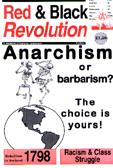Over 30 years of anarchist writing from Ireland listed under hundreds of topics
Meat 'n' Veg 'n' Microlivestock
Vegetarianism and environmentalism often go hand in hand. This is partly because the consumption of large livestock has itself an effect on the environment. It takes seven pounds of grain to produce one pound of beef - if we were all to become vegetarian, so the argument goes, much less land would have to be used for agriculture. This is true to a certain extent, but the grain:meat ratio leaves out many things. For example, a cow produces not just meat, but milk, leather and dung (a fertiliser, soil stabiliser, and even fuel source). Wool, feathers and eggs are all useful 'by-products' of animal husbandry that have to taken into account.
Even so, raising animals is not the most efficient use of agricultural land. But a lot of land is not suitable for other forms of agriculture. Animals can be raised in forests, or on the side of mountains, and in areas where the soil is too poor for crop production. Many animals can be reared alongside crops, and others, like poultry, are well suited to small scale farming. Turning over whole prairies to cows for grazing is certainly inefficient, but that's not the only way to farm animals.
The tendency in agriculture (as in industry) in the last century has been for specialisation, and for the production of smaller herds, made up of larger animals. Purchase goes into some detail on the virtues of microlivestock - smaller, more adaptable, and generally hardier versions of the more common modern animals. Such animals are more productive - the greater number that can be raised on a given area of land makes up for their small size - and it's easier to match the size of the herd to the land available. All of these factors make them ideal for the kind of small-scale mixed farming he proposes should be (re-)introduced to our cities.
The question of efficiency is not the only reason so many environmentalists are also vegetarian. After all, the battery farm is perhaps the epitome of efficiency, and that has few friends in the green movement. There is also a moral argument, that we should try to reduce the effects of humanity on the planet, and on the animals that live alongside us. Purchase quotes Elisee Reclus, a well known anarchist of the 19th century, "for the great majority of vegetarians...the important point is the recognition of the bond of affection and goodwill that links man to the so-called lower animals, and the extension to these our brothers of the sentiment which has already put a stop to cannibalism among men"1. You will have to judge the merits of this argument for yourself, Purchase shows that it is not necessarily relevant to a discussion of the environment, and that a meat-eating society can still be green.
1 "On Vegetarianism", 1901
This article is from Red and Black Revolution 4, published November 2000

Read the rest of the articles in this issue online at http://www.wsm.ie/story/1887
Download the PDF file from http://struggle.ws/pdfs/RBR4.pdf
Read all the issues of Red and Black Revolution at http://www.wsm.ie/rbr

